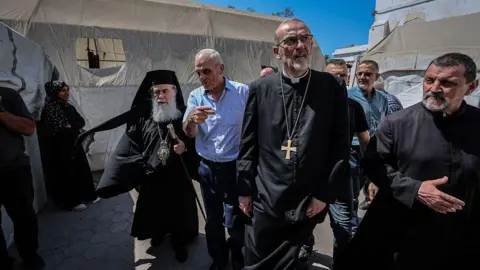In a recent and rare visit to Gaza, church leaders returned with profound emotional turmoil, describing their experiences as having “broken hearts.” This visit follows a troubling escalation in violence that has gripped the region. The Latin Patriarch, Cardinal Pierbattista Pizzaballa, along with the Greek Orthodox Patriarch, Theophilos III, witnessed firsthand the dire conditions of the inhabitants, particularly the suffering of children marred by the continual sound of bombing. Their harrowing observations were notably poignant, as Cardinal Pizzaballa recounted seeing men waiting for hours under the sun, hoping for even a simple meal amidst the chaos.
Cardinal Pizzaballa emphasized the gravity of the situation, asserting that such humiliation is intolerable when seen in person, labeling it as morally unacceptable and unjustifiable. Theophilos III voiced a commitment from his church to stand in solidarity with the people of Gaza, emphasizing the shared humanity that binds them. The church leaders’ trip comes in the wake of an Israeli strike on the Catholic Holy Family Church in Gaza City, which resulted in the deaths of two women and a man, igniting international concern and outrage.
The situation escalated further as U.S. President Donald Trump reportedly urged Israeli Prime Minister Benjamin Netanyahu to address the concerns regarding the strike on the church, which was described by Netanyahu’s office as a regrettable incident involving “stray ammunition.” However, skepticism lingers among local Christians about whether the church was deliberately targeted. In a stark reflection of the wider humanitarian crisis, approximately four hundred people were found taking refuge within the church grounds, which fall under evacuation orders.
During a media briefing post-visit, Cardinal Pizzaballa expressed shared suffering, noting that although three individuals in the Christian community lost their lives, the broader Palestinian population has faced the tragic loss of thousands. The state of violence and instability prevailing in the region, especially reflected in recent settler aggression in Taybeh, underscores the descent into chaos across parts of the West Bank, which he described as “no-law land.”
While assurances were made that aid in the form of 500 tonnes would reach Gaza, logistical hurdles have hampered its delivery. The frustrations and disappointments of those in need were palpable, as the leaders expressed their distress over those who had gathered at the church expecting assistance that had not yet arrived.
In their visit, Pizzaballa and Theophilos III were met with stark images of despair—collapsed buildings, extensive ruin, and a population living in tents, representative of the intensifying humanitarian crisis. The church leaders reported that many people they met appeared to be suffering extreme starvation, highlighting the urgent need for humanitarian relief amid the ongoing conflict.
Both patriarchs later reported on a visit to Taybeh, where residents alleged attacks by Israeli settlers, including an incident determined to be a fire near the Byzantine Church of St. George. Israeli authorities responded, asserting that no damage occurred to the church, despite eyewitness accounts of settlers initiating the blaze. This reflects a larger and pervasive fear within Palestinian communities regarding the safety of their holy sites and the integrity of their land as settlers continue to encroach.
Adding to the complexity of the situation, U.S. ambassador Mike Huckabee visited Taybeh, denouncing the church attack as an act of terror and calling for accountability, signaling a division even within supporter circles of Israel. Cardinal Pierbattista Pizzaballa reiterated the need for support for the small Christian community in Gaza, ensuring the continuity of their presence amidst a backdrop of increasing pressures.
As they concluded their visit, church leaders called for a ceasefire and articulated the necessity for dialogue and intervention in Gaza’s humanitarian plight, firmly stating that the current policies enacted by the Israeli government were unacceptable and needed reevaluation. This sentiment echoes calls from international leaders, emphasizing a desperation for peace in a region long accustomed to conflict.












